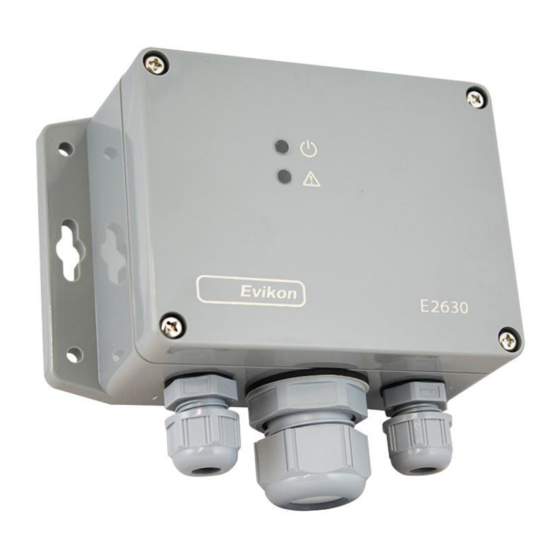
Table of Contents
Advertisement
Quick Links
Advertisement
Table of Contents

Summary of Contents for Evikon E2630-LEL
- Page 1 Combustible Gas Detector E2630-LEL User Manual...
-
Page 2: Table Of Contents
E2630-LEL Rev 23.03.2021 Table of contents Acetylene Butane Hydrogen Methane Propane Specifications Product description Safety requirements Operating conditions Installation guidelines Mounting dimensions Connections Operation Sensor probe handling Maintenance Calibration Delivery set Order code for E2630-LEL options Warranty Manufacturer contacts... -
Page 3: Acetylene
E2630-LEL Rev 23.03.2021 Acetylene A colorless flammable gas, lighter than air. Mixtures with air are explosive. It results from the interaction of calcium carbide with water. In industrial production, acetylene is mainly manufactured by the pyrolysis of light hydrocarbons. Acetylene is widely used for welding and cutting of metals. The usage of acetylene as a feedstock in the chemical industry declines due to cost and environmental considerations. -
Page 4: Butane
E2630-LEL Rev 23.03.2021 Butane A colorless flammable gas that is heavier than air. The term “butane” is used for any of two structural isomers (n-butane or iso-butane, with unbranched and branched-chain respectively) or for their mixture. Occurs in light petroleum fractions. -
Page 5: Hydrogen
E2630-LEL Rev 23.03.2021 Hydrogen A colorless, odorless, flammable gas, that is much lighter than air. Mixtures with air are explosive. Results from the interaction of acids, bases, and water with active metals and from the electrolysis of aqueous solutions. In industrial production, the main source of hydrogen is hydrocarbons. -
Page 6: Methane
E2630-LEL Rev 23.03.2021 Methane A colorless flammable gas, the main component of natural gas, marsh gases. Methane results from bacterial decomposition of plant and animal matter (landfill gas). Methane is widely used as a fuel and chemical feedstock. Synonyms: Marsh Gas, Natural Gas, Carbon tetrahydride, Hydrogen carbide. -
Page 7: Propane
E2630-LEL Rev 23.03.2021 Propane A colorless flammable gas that is heavier than air. it occurs in light petroleum fractions. Propane is used mainly as a fuel and as a feedstock in organic synthesis. It is applied also as a propellant in aerosol sprays and may be used as an ozone-friendly refrigerant. -
Page 8: Specifications
E2630-LEL Rev 23.03.2021 Specifications Sensor type Metal Oxide Semiconductor Sampling method Diffusion Typical detection range 0...100% LEL Alarm setpoints 7 - 10 - 25 %LEL (release-LOW-HIGH) Response time T90 ca. 60 s Signal update Every 1 second Sensor lifetime > 5 years... -
Page 9: Product Description
E2630-LEL Rev 23.03.2021 Product description E2630 series gas detectors are compact and easy-to-use instruments. The devices utilize novel fully calibrated and temperature compensated gas sensors with excellent repeatability, stability and long lifetime. Two relays RE1 and RE2 with switching contacts can be used to control alarm sirens, ventilation fans, shut-off valves or other actuators. - Page 10 E2630-LEL Rev 23.03.2021 There are no precise rules or standards to follow when installing gas detectors. The following points must be taken into account: ● Application (air quality control or leakage detection.) Properties of the space under investigation (room geometry, direction, and ●...
-
Page 11: Mounting Dimensions
E2630-LEL Rev 23.03.2021 Mounting dimensions... -
Page 12: Connections
E2630-LEL Rev 23.03.2021 Connections 1. Unscrew four lid screws and detach the lid from the device; 2. Attach the device to the wall using provided screws through the side mounting holes or key slots (This step may be done before step 1, consider your convenience). -
Page 13: Operation
E2630-LEL Rev 23.03.2021 Operation During the first ca. 60 seconds after powering on E2630 performs a warming-up and self-diagnostic routine, indicated by the flashing of each LED. The upper dual-color LED remains continuously green in normal operation and blinks red in case of device or sensor fault. -
Page 14: Sensor Probe Handling
E2630-LEL Rev 23.03.2021 Sensor probe handling The sensor probes of all types are equipped with a hydrophobic microporous PTFE filter to protect the sensor from dust, dirt, and water drops. The filter may be replaced if it gets strongly contaminated. To replace the PTFE filter, unscrew the sensor head cap and remove the old filter. -
Page 15: Maintenance
Calibration E2630-LEL detectors have been calibrated by the Manufacturer with standard gas mixtures before delivery. Provided that the sensor is used under moderate conditions, field recalibration is recommended every 12 months. Please contact your dealer for more information. -
Page 16: Warranty
Manufacturer or damaged by customer error or negligence or if there has been an unauthorized modification. Manufacturer contacts Evikon MCI OÜ Teaduspargi 7/9, Tartu 50411 Estonia info@evikon.eu...
















Need help?
Do you have a question about the E2630-LEL and is the answer not in the manual?
Questions and answers